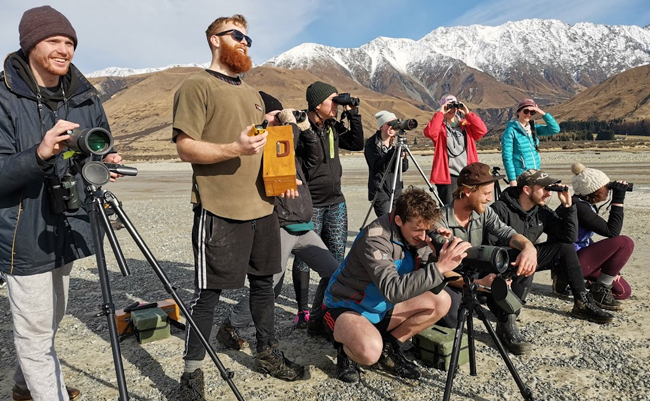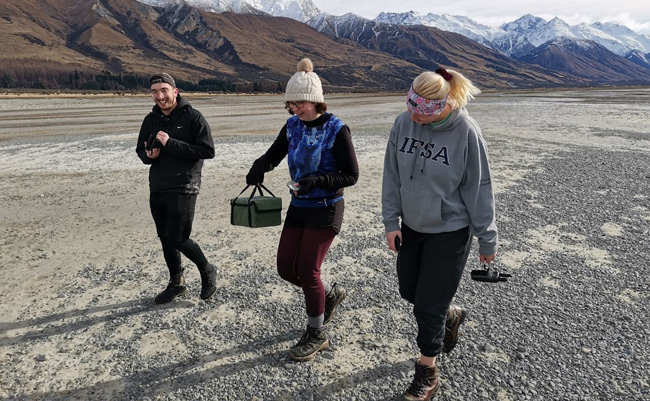
The 12 students on the University of Otago Wildlife Management programme's 20th annual fieldtrip using spotting scopes and binoculars to search for birds on the Tasman Delta.
The University's Wildlife Management programme can finally celebrate its 20th annual fieldtrip to Twizel following its initial postponement due to the COVID-19 Level 4 lockdown.
The postgraduate fieldtrip has become a signature trip of the programme's calendar since 2001 when Professor Phil Seddon was appointed as the Director of Wildlife Management.
Hosted annually by the Department of Conservation (DOC), Professor Seddon says DOC's Twizel operations are of on-going value as a one-stop-shop for students studying wildlife management challenges and responses in New Zealand.
"It's an incredibly beautiful area to work in and combining this with the experience of working with such rare and beautiful birds makes it such an invaluable experience for students wanting to move into the field of wildlife management."
“The region has everything from critically endangered species, almost every invasive predator species plus weeds, exciting new work around large-scale predator control, and mixed land uses across iconic drylands and braided river landscapes,” Professor Seddon says.
“Students are given unparalleled access to DOC expertise dealing with all these challenges, and also the unique opportunity to interact with endangered species such as the Kakī (Black Stilt), an endemic species which has the same critical conservation status as Kakapo.”
Reflecting on the 20 trips, Professor Seddon says graduates from the programme are scattered all over the country and they themselves are now employing the new generation of graduates, so the Twizel fieldtrip is now a nice linking experience for them all.
Otago's Wildlife Management Programme has been running since the 1960s and its alumni now work far and wide including as wildlife managers and researchers with DOC, regional councils, NGOs, environmental consultancies, and Crown Research Institutes.
Dr Richard Maloney, the DOC scientist overseeing these visits, has been part of the visits from the start and also recognises the reciprocal value of exposing the next generation of wildlife managers to the local, practical, field-based programmes.
“DOC make a point of saying they don't have all the answers and say they appreciate the access to fresh thinking from the students who will be the next conservation managers,” Professor Seddon says.
The recent fieldtrip included 12 students assisting DOC Aviculturalist Liz Brown and her staff with Kakī health checks at the captive breeding facilities for when they are released back into the wild.
The students also spent time on the Tasman Delta with DOC Field Coordinator Claudia Mischler, recording the band combinations for previously released Kaki, and undertook a simulation exercise locating 'dummy' nests and collecting eggs for incubation in captivity.

Students (from left) Thor Elley, Abby Clarke and Shannon Ritter on the winning team carrying mock Kakī eggs after collecting them from a nest and transferring to breeding facilities as part of the Kakī recovery programme.
Student Abby Clarke (pictured above) was on the winning team and says it was challenging as Kakī 'nests' are usually just bare stones making it difficult to spot the eggs.
“It's an incredibly beautiful area to work in and combining this with the experience of working with such rare and beautiful birds makes it such an invaluable experience for students wanting to move into the field of wildlife management,” Abby reflects.
Dr Maloney says an additional benefit to DOC having direct access to the skills of Wildlife Management staff and the students is that some go on to complete postgraduate projects on key questions in the Mackenzie Basin.
“All of us, rangers and science staff, get a lot out of our interactions with the students on the fieldtrip,” he says.
“It's fun and refreshing. It makes us review how we work, gives us new ideas, and shows us the possibilities for future directions.”
Story by Guy Frederick (Communications Adviser, Division of Sciences).